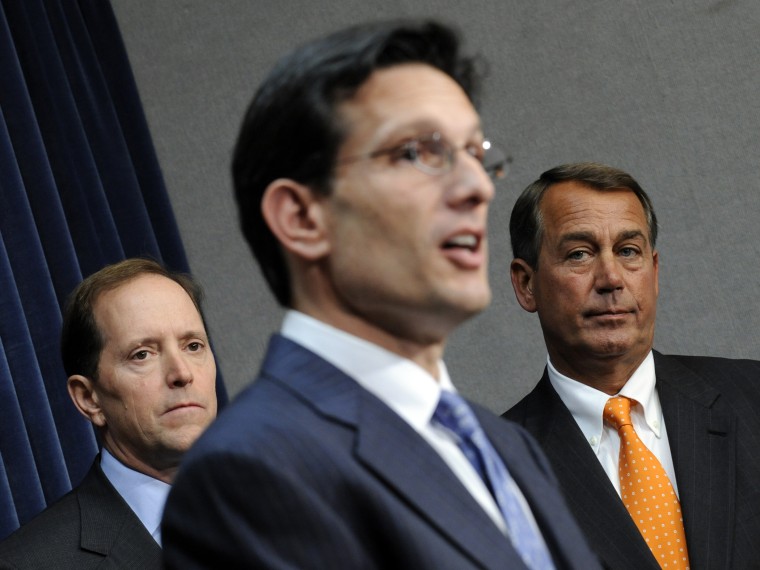Following up on an item from the other day, House Republicans decided at the beginning of this Congress that tax reform would be their top legislative priority. It was given the special H.R. 1 designation -- a symbolic bill number intended to convey its significance.
And to that end, House Ways and Means Committee Chairman Dave Camp (R-Mich.) has spent nearly three years on his plan to overhaul the federal tax code, including months of negotiations with Senate Finance Committee Chairman Max Baucus (D-Mont.). The goal was to unveil a blueprint in 2013 so the broader legislative debate could begin in earnest.
But that recently ran into an unexpected hurdle -- some House Republicans would rather focus their energies and resources on condemning the Affordable Care Act, and have come to see tax reform as a distraction. House GOP leaders are apparently thinking along similar lines.
House Ways and Means Committee Chairman Dave Camp on Thursday signaled his quest to jump-start a tax code rewrite this year is on hold, after emerging from a meeting with Republican leaders deeply skeptical of stepping into a political minefield. The chief Republican tax writer has had to backtrack from steadfast pledges to introduce the first tax code overhaul in a generation this year, after skittish Republicans saw political gold in the botched rollout of Obamacare.
In fairness, there are other, unrelated concerns -- Camp hasn't yet invested much time in winning allies for his plan, which certainly matters -- but it's the Affordable Care Act that seems to have ensured that tax reform is on ice, perhaps indefinitely.
When Politico asked whether his bill will surface anytime soon, he replied, "Clearly timing is important. We're going to move ahead on the bill and continue to refine it." He added, "I'm not going to make a prediction on that right now."
For the House Ways and Means Committee chairman, this has to be disappointing. He not only promised to introduce his proposal this year, but he's spent three years working on it. Worse, Camp will be term-limited out of his chairmanship at the end of this Congress, even if House Republicans maintain their majority. This is his last chance, and it's slipping away.
But the larger point has to do with the GOP's willingness to govern. To be sure, it's the norm in nearly all Congresses that a majority party's leaders are going to have to prioritize between competing goals. Even the most ambitious and productive sessions can't complete everything the majority would like to accomplish.
But this usually means choosing between specific policy goals: maybe a Congress will tackle immigration, but not energy. It'll make time for financial industry reforms, but not civil rights.
This Congress is a little different. We're now seeing House Republican leaders abandon every meaningful policy goal -- even the measures the GOP considers top priorities -- not to work on health care policy, per se, but rather to attack a health care policy that already exists, and that they'll probably never be able to change.
In other words, Boehner & Co. recognize they have an opportunity for a rare accomplishment, but are choosing to deliberately cast that opportunity aside -- not for some other, equally worthy goal, but to just launch public-relations offensives against a moderate health care law.
